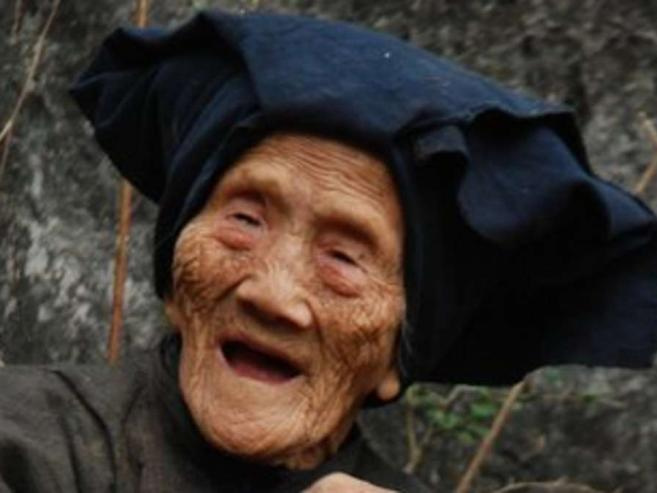
Amy Capetta
Most
supercentenarians (people who live to at least 110 years old) have one
thing in common: They’re women. According to researchers at Stanford
University, 95 percent of the world’s oldest people are female.
Here’s a small sampling of the proof: The oldest person on Earth today is Jeralean Talley from the Detroit area, who is 115. She took the crown in April from 116-year-old Gertrude Weaver, who took it from Misao Okawa, who passed away in April at 117. But so far, no one has outlived Jeanne Louise Calment from France, who is listed in Guinness World Records
as the oldest living person recorded. Calment was born in 1875 — one
year before the telephone was invented — and died in 1997 at the ripe
old age of 122.
The Stanford scientists, who shared their findings in the journal Cell Stem Cell, point
to previous research on estrogen, the hormone that controls the female
reproductive cycle, as a possible factor. One study states that estrogen
has been shown to increase the number of blood stem cells in female
mice, ultimately boosting the “regenerative capacity” of stem cells in
the brain, while another study discovered that male mice lived longer
with the help of estrogen supplements.
Then there’s the research from the Boston University School of Medicine,
which found that women who conceive children after the age of 33 have a
higher chance of living extra years compared to women who gave birth to
their last child before turning 30.
However, not every piece of science indicates that women have it easier than men. Research conducted in 2014 at Duke University School of Medicine
revealed that stress is more damaging to women’s hearts. When the male
and female study participants were asked to describe a previously
stressful event, 57 percent of the women experienced reduced blood flow
to the heart or ischemia — which can lead to cardiovascular disease —
compared to 41 percent of men.
“From
our own studies, we know that women definitely win the longevity
marathon — 85 percent of centenarians are women and 15 percent are men,”
Thomas Perls, MD, a geriatrician at Boston Medical Center and a professor of medicine at Boston University School of Medicine,
tells Yahoo Health. And while it may seem that all arrows point to
estrogen as the key, Perls says the power may have to do with iron — or
rather, lack of it.
“Menstruation
leads to iron deficiency, which when it doesn’t lead to symptomatic
anemia, may be very good for you,” Perls explains. “It turns out that
iron is a critical player in our cells’ ability to produce oxygen free
radicals (via something called the Fenton and Haber-Weiss reactions),
which although important in fighting infections are also important
contributors to aging. These very reactive molecules can cause damage to
our DNA, cell membranes, and other structures that likely contribute to
aging. So by having less iron, women might produce fewer oxygen free
radicals, which might translate into slower aging and decreased risk for
age-related diseases.”
Perls
adds that others joke he attempts to menstruate every eight weeks by
donating blood at his local blood bank. “To me, it is more than an
altruistic act — I’m trying to get at least a little iron deficient for
healthier aging,” he says. “Even if this theory is not right, I’m still
donating blood for people who need it!”
He
continues that one still can’t help but question why women can live
50-plus years beyond the average age of menopause, which he says is
estimated to begin at 53. Another theory: It may have something to do
with evolution.
“The
need to live long enough to take care of our kids until they themselves
can have children, or to live long enough to become grandparents,
likely led to the selection of genes that allowed humans to age more
slowly and to defend them from aging-related genes that adversely impact
upon fertility,” he says. “A longer reproductive span increases a
woman’s opportunity to successfully have children, therefore increasing
her chance of winning the evolution game — she who has the greatest
chance of passing her genes on to the next generation wins!”
Walter M. Bortz II, MD, a clinical professor of medicine at Stanford University School of Medicine and author of Dare To Be 100,
also feels that Mother Nature plays a pivotal role in keeping women
around longer. “Nature puts a higher premium on the female species
because they’re around for the duration, while men are there for the
moment,” he tells Yahoo Health.
And
then there’s the bonding aspect. “Women nurture; they have a circle of
friends their whole life, while men tend to be loners,” he explains,
adding that women have also been shown to be more resilient. “It’s true
that when a wife dies, it kills the husband. But when a husband dies, it
doesn’t kill the wife. Men are brittle; we break, women bend.”
While
Bortz jokingly says a female’s longevity also has to do with her
fashion sense — “Women are always dressed like they’re going to a party.
Men dress like they’re going to a funeral!” — he states that both women
and men can stick around longer if they make it a point to just keep
moving.
“All
that life does is take solar energy and makes it useful,” says the
85-year-old expert, who writes, teaches, lectures, and runs regularly.
“And that’s what exercise does — I’m a firm believer in that exercise is
the magic elixir!” (In fact, a recent study found that even small doses of physical activity can keep the Grim Reaper away.)
“Here’s my law: It’s never too late to start, but it’s always too soon to stop.”